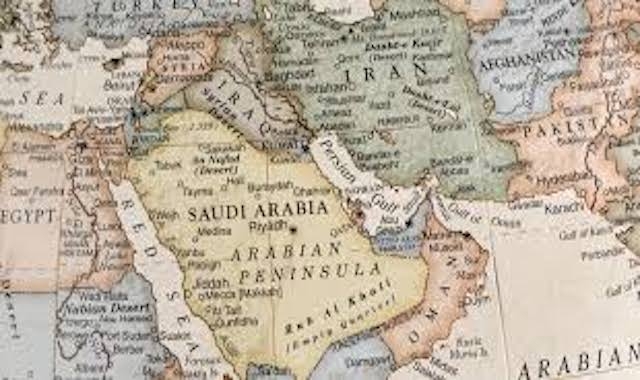Israel is surrounded by an abundance of countries that share much in common with their not-so-beloved neighbor: language, cuisine, religion, and much more. However, there is one trait most of these countries share, which Israel hasn't experienced in many decades: financial instability.
Despite an abundance of opportunities in terms of natural resources and a growing demographic of young, capable manpower, Lebanon, the Palestinian Territories, Syria, and many more of Israel's indirect neighbors suffer from poverty and weak currencies. These conditions often go hand-in-hand with extremist movements and political instability. While some leaders have realized this, the locals in these Middle Eastern countries have yet to recognize that the solution to much, if not all, of their fiscal insecurities lies right across the border and would be more than willing to help.
The prospect of normalization of relations between Israel & Saudi Arabia will have enormous implications on Israel and the entire region. The question is, will Prime Minister Netanyahu muster the courage to do what’s best for the country, ✍️@AlonBenMeir https://t.co/PrmIWB7hfx pic.twitter.com/PQjX59Toc1
— Inter Press Service (@ipsnews) August 26, 2023
Take the Lebanese liquidity crisis, for example, which has been crippling the nation's economy for months now. It is a direct result of the government's corruption and cooperation with bad actors in the region, such as Iranian-backed Hezbollah and the Syrian Assad regime. Potentially, Lebanon's economy could flourish while sustaining itself on tourism and resources like natural gas and timber—industries that could be up and running within a matter of months if the right partnerships were made. However, the stubbornness of the Lebanese populace and general hostility against Israel enable terrorist organizations such as Hezbollah to continue their activities, which, for obvious reasons, deter foreign investors from setting foot in the country. Let that sink in: an entire nation's financial security hinges on just one simple decision—normalization with Israel.
No one is asking the Lebanese people to adore their Israeli neighbors; nobody is even asking them to discontinue any non-violent activities against Zionism. All that is being asked is for them to accept the practical reality of the existence of Israel and understand that an armed struggle against it is simply not efficient by any means.
A complex landscape of opinions and enormous variations between Arabs youths across the region regarding normalization with Israel. Tough challenge for MBS normalizing with Israel with only 2% of his country's youth supporting it.#AbrahamAccords #Arabbarometer pic.twitter.com/QQbzsRZ2GX
— Anders Persson (@82AndersPersson) August 17, 2023
Simultaneously, another form of stubborn yet crippling denial of Israel is taking place within the Palestinian Territories. Officially, the Palestinian Authority recognizes Israel in accordance with the 1967 borders. However, the population, along with many terrorist organizations, refuses categorically to acknowledge the truth of today's geopolitical situation. In a recent statement issued by Hamas via its Telegram channel, it was declared that "the cessation of attacks in the West Bank is conditional on the end of the occupation and the settlements." Despite the reality that over 500,000 Israelis live in Judea and Samaria today, generating hundreds of millions in revenue, and more than 150,000 Palestinians legally cross into Israel daily for work, Hamas still deems it fit to assert they will not end terrorism until Israel vacates the region completely and allows them to take over.
Prior to issuing their conditions for ending terrorism, Hamas also criticized the Israeli government for approving a 3.2 billion NIS budget for East Jerusalem, labeling it "a path that serves the interests of the occupation and its plans to Judaize [East Jerusalem]." The worst part is that a large portion of the Palestinian public supports Hamas and their delusional statements, ignoring the dire need for financial stability that Israel can provide. Just like Lebanon, nobody is asking them to like Israel or suddenly become Zionist activists; all that is being asked is to recognize Israel as a current reality and to acknowledge that armed guerrilla warfare against it is less productive for Palestinians than working together to improve their financial situation.
Seeking a legacy-defining accord in the region, and having failed to revive the 2015 Iran nuclear deal, the Biden admin now aims to help expand Israel’s normalization with the Arab world.
— Amwaj.media (@amwajmedia) August 12, 2023
Will this approach succeed? @amwajmedia has the story👇https://t.co/cTWDJwFHAU
This perspective may sound off-putting coming from a Zionist publication, but what is so peculiar about these examples of stubbornness when it comes to Israel is that their ambitions to see Israel collapse would be far more achievable if their economies would mimic Israel's. In other words, Israel is at a rare crossroads where it is now literally offering briefcases of stability and cash to all its former hostile neighbors who will recognize its existence and cooperate. Once these countries find themselves in a better situation, their chances of making an impact on Israel's reality will improve drastically. Despite this, Israel's neighbors fail to recognize this rare opportunity for what it is: a once-in-a-lifetime offer.


